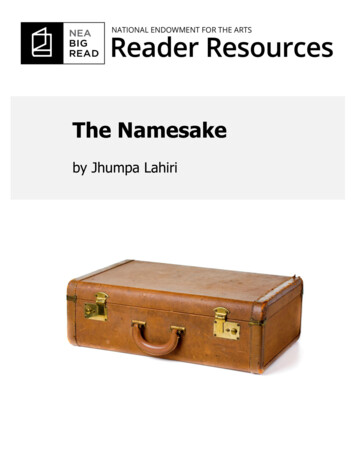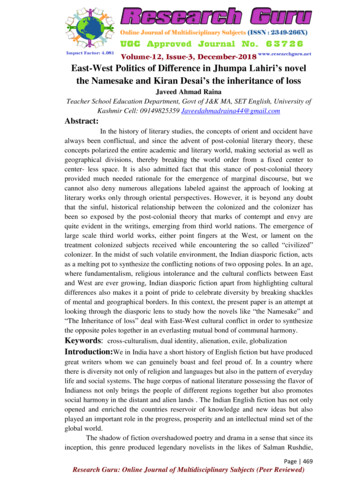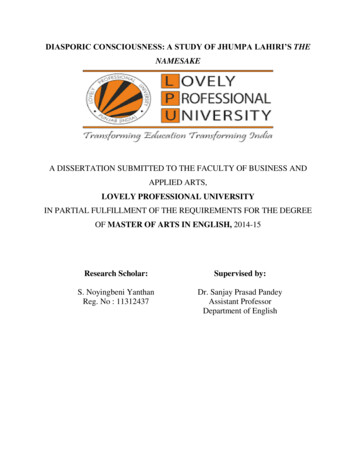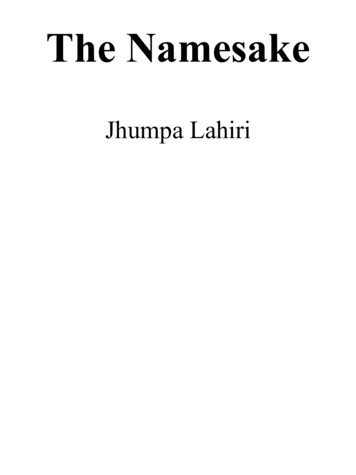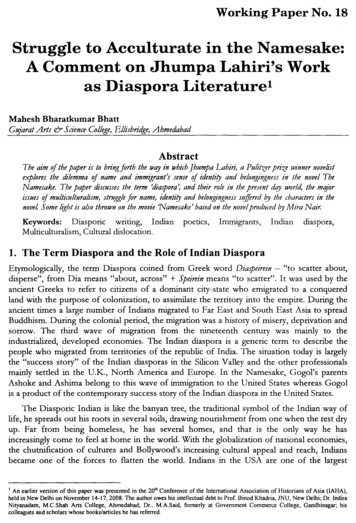
Transcription
The NamesakeJhumpa Lahiri
EXTRAORDINARY PRAISE FORTHE NAMESAKE"Extraordinary . an insightful and descriptive take on family, tradition, and selfacceptance . Jhumpa Lahiri is an accomplished novelist of the first rank." —San DiegoUnion-Tribune"Memorable fiction . Lahiri's gift is for shrewd insight into character done up inelegantly understated prose . Astringent and clear-eyed in thought, vivid in itsportraiture, attuned to American particulars and universal yearnings." —Newsday"A moving first novel . Lahiri writes beautifully controlled prose." —San FranciscoChronicle"Lahiri's writing is assured and patient, inspiring immediate confidence that we are intrustworthy hands. Lahiri beautifully conveys the émigré's disorientation, nostalgia, andyearning for tastes, smells, and customs left behind."—Los Angeles Times Book Review"Poignant . A novel of exquisite and subtle tension, spanning two generations andcontinents and a plethora of emotional compromises in between . The Namesake is astory of guilt and liberation; it speaks to the universal struggle to extricate ourselvesfrom the past—from family and obligation and the curse of history." —Boston Globe"Quietly dazzling . The Namesake is that rare thing: an intimate, closely observedfamily portrait that effortlessly and discreetly unfolds to disclose a capacious socialvision . . . a debut novel that is as assured and eloquent as the work of a longtimemaster of the craft." —New York Times"This novel powerfully depicts the universal pull of family traditions." —Lifetime"Lahiri's graceful first novel more than ful.lls the promise of her Pulitzer-winning storycollection . The exquisitely detailed saga of the Ganguli family . becomes the classicstory of American immigration and assimilation."—Entertainment Weekly"The Namesake . confirms what her first book suggested—that she's a writer ofuncommon grace and sympathy."—San Jose Mercury News"Lahiri handles issues of assimilation and belonging with her trademark mix of quietobservation and heartbreaking honesty . the casual beauty of the writing keeps thepages turning."—Elle"Written in an elegant hush—even upon rereading, there isn't a single burned raisin inthe mix."—New York Times Book Review"This tale of aspiration and double identity is far more authentic and lavishly imaginedthan many other young writers' best work." —Time Out New York"Hugely appealing . Gracefully written and filled with wellobserved details, Lahiri'snovel—like her hero—manages to bridge two very different societies and to give us theabsolute best of both." —People"Lahiri is an intuitive writer . her gift is a power of sympathy."— The Nation"This eagerly anticipated debut novel deftly expands on Lahiri's signature themes oflove, solitude, and cultural disorientation."— Harper's Bazaar"A full flowering of her talent . beautifully rendered . Lahiri displays the knowingnessof the native with the newcomer's openness to every detail." —New York"The Namesake does such a remarkable job of depicting the importance of family andhow people cope in unfamiliar terrain that it is one of the best works of fiction publishedthis year."—Seattle Times"Achingly artful, Lahiri's first novel showcases her prodigious gifts." —Baltimore Sun
"A book to savor, certainly one of the best of the year, and further proof that thisimmensely talented writer's prizewinning ways are far from over." —Atlanta JournalConstitution"A poignant, beautifully crafted tale of culture shock . Reading it, anyone willunderstand how it feels to be a cultural outsider."—Fort Worth Morning Star-Telegram"A fine novel from a superb writer." —Washington Post"Emotionally charged and deeply poignant, Lahiri's tale provides panoramic views of hercharacters' lives."—Philadelphia Inquirer"An enjoyably old-fashioned novel . written in clear, quietly elegant prose . A giftedstoryteller, Lahiri has proven her literary mettle." —Raleigh News and Observer"The Namesake is a quietly moving first novel . Intensely absorbing . locates theuniversality in precisely evoked individuality." —Columbus Dispatch"Against all that is irrational and inevitable about life, Lahiri posits the timeless,borderless eloquence and permanence of great writing." —Pittsburgh Post-Gazette"Sparingly beautiful prose . Lahiri's novel ultimately dramatizes a common experienceshared by all people: the search for identity." —Fort Lauderdale Sun-Sentinel"[Lahiri's] simple, understated prose creates an emotional urgency that distinguishes herwork from much more cluttered (and less vivid) contemporary fiction." —Town &Country"Lahiri's multiple gifts for storytelling, character development, and delicately preciseimagery result in a rare and wonderful tale." —Orlando Sentinel"Lahiri's style in this novel, as in her short fiction, is graceful and beautiful." —SanAntonio Express-News"Readers will find here the same elegant, deceptively simple prose that garnered somuch praise for her short stories . The result is a seemingly quiet, almost undramaticnovel whose characters and incidents continue to leap freshly to mind weeks afterreading it." —Book Page"A powerful and original voice." —Star TribuneBOOKS BY JHUMPA LAHIRIInterpreter of MaladiesThe NamesakeA MARINER BOOKHOUGHTON MIFFLIN COMPANYBOSTON NEW YORKFirst Mariner Books edition 2004Copyright 2003 by Jhumpa LahiriAll rights reservedFor information about permission to reproduce selectionsfrom this book, write to Permissions, Houghton Mifflin Company,215 Park Avenue South, New York, New York 10003.Visit our Web site: www.houghtonmifflinbooks.com.Library of Congress Cataloging-in-Publication DataLahiri, Jhumpa.The namesake / Jhumpa Lahiri.p. cm.ISBN 0-618-48522-8 (pbk.)ISBN 0-395-92721-81. Young men—Fiction. 2. Massachusetts—Fiction. 3. EastIndian Americans—Fiction. 4. Children of immigrants—Fiction. 5. Assimilation (Sociology)—Fiction. 6. Alienation(Social psychology)—Fiction. 7. Gogol, Nikolai Vasilievich,
1809-1852—Appreciation—Fiction. I. Title.ps3562.a3i6n36 2003813'.54—dc2i 2003041718Book design by Melissa LotfyTypefaces: Janson and SerlioPrinted in the United States of AmericaMP 10 9 8 7 6 5 4 3 2 1A portion of this book appeared in slightly different formin The New Yorker.AcknowledgmentsI wish to thank the John Simon Guggenheim Foundation forits generous support. My deepest thanks also go to Susan Choi,Carin Clevidence, Gita Daneshjoo, Samantha Gillison, DaphneKalotay, Cressida Leyshon, Heidi Pitlor, Janet Silver, Eric Simonoff,and Jayne Yaffe Kemp.I am indebted to the following books: Nikolai Gogol, by VladimirNabokov, and Divided Soul: The Life of Gogol, by Henri Troyat.Quotations from "The Overcoat" are from David Magarshack'stranslation.For Alberto and Octavio, whom I call by other namesThe reader should realize himself that it could not have happened otherwise, and that togive him any other name was quite out of the question.—NIKOLAI GOGOL, "The Overcoat"
11968On a sticky august evening two weeks before her due date, Ashima Ganguli stands inthe kitchen of a Central Square apartment, combining Rice Krispies and Planterspeanuts and chopped red onion in a bowl. She adds salt, lemon juice, thin slices ofgreen chili pepper, wishing there were mustard oil to pour into the mix. Ashima hasbeen consuming this concoction throughout her pregnancy, a humble approximation ofthe snack sold for pennies on Calcutta sidewalks and on railway platforms throughoutIndia, spilling from newspaper cones. Even now that there is barely space inside her, itis the one thing she craves. Tasting from a cupped palm, she frowns; as usual, there'ssomething missing. She stares blankly at the pegboard behind the countertop where hercooking utensils hang, all slightly coated with grease. She wipes sweat from her facewith the free end of her sari. Her swollen feet ache against speckled gray linoleum. Herpelvis aches from the baby's weight. She opens a cupboard, the shelves lined with agrimy yellow-and-white-checkered paper she's been meaning to replace, and reachesfor another onion, frowning again as she pulls at its crisp magenta skin. A curiouswarmth floods her abdomen, followed by a tightening so severe she doubles over,gasping without sound, dropping the onion with a thud on the floor.The sensation passes, only to be followed by a more enduring spasm of discomfort. Inthe bathroom she discovers, on her underpants, a solid streak of brownish blood. Shecalls out to her husband, Ashoke, a doctoral candidate in electrical engineering at MIT,who is studying in the bedroom. He leans over a card table; the edge of their bed, twotwin mattresses pushed together under a red and purple batik spread, serves as hischair. When she calls out to Ashoke, she doesn't say his name. Ashima never thinks ofher husband's name when she thinks of her husband, even though she knows perfectlywell what it is. She has adopted his surname but refuses, for propriety's sake, to utterhis first. It's not the type of thing Bengali wives do. Like a kiss or caress in a Hindimovie, a husband's name is something intimate and therefore unspoken, cleverlypatched over. And so, instead of saying Ashoke's name, she utters the interrogative thathas come to replace it, which translates roughly as "Are you listening to me?"At dawn a taxi is called to ferry them through deserted Cambridge streets, upMassachusetts Avenue and past Harvard Yard, to Mount Auburn Hospital. Ashimaregisters, answering questions about the frequency and duration of the contractions, asAshoke fills out the forms. She is seated in a wheelchair and pushed through theshining, brightly lit corridors, whisked into an elevator more spacious than her kitchen.On the maternity floor she is assigned to a bed by a window, in a room at the end of thehall. She is asked to remove her Murshidabad silk sari in favor of a flowered cottongown that, to her mild embarrassment, only reaches her knees. A nurse offers to fold upthe sari but, exasperated by the six slippery yards, ends up stuffing the material intoAshima's slate blue suitcase. Her obstetrician, Dr. Ashley, gauntly handsome in a LordMountbatten sort of way, with fine sand-colored hair swept back from his temples,arrives to examine her progress. The baby's head is in the proper position, has alreadybegun its descent. She is told that she is still in early labor, three centimeters dilated,beginning to efface. "What does it mean, dilated?" she asks, and Dr. Ashley holds uptwo fingers side by side, then draws them apart, explaining the unimaginable thing herbody must do in order for the baby to pass. The process will take some time, Dr. Ashleytells her; given that this is her first pregnancy, labor can take twenty-four hours,sometimes more. She searches for Ashoke's face, but he has stepped behind thecurtain the doctor has drawn. "I'll be back," Ashoke says to her in Bengali, and then anurse adds: "Don't you worry, Mr. Ganguli. She's got a long ways to go. We can take
over from here."Now she is alone, cut off by curtains from the three other women in the room. Onewoman's name, she gathers from bits of conversation, is Beverly. Another is Lois. Carollies to her left. "Goddamnit, goddamn you, this is hell," she hears one of them say. Andthen a man's voice: "I love you, sweetheart." Words Ashima has neither heard norexpects to hear from her own husband; this is not how they are. It is the first time in herlife she has slept alone, surrounded by strangers; all her life she has slept either in aroom with her parents, or with Ashoke at her side. She wishes the curtains were open,so that she could talk to the American women. Perhaps one of them has given birthbefore, can tell her what to expect. But she has gathered that Americans, in spite oftheir public declarations of affection, in spite of their miniskirts and bikinis, in spite oftheir hand-holding on the street and lying on top of each other on the CambridgeCommon, prefer their privacy. She spreads her fingers over the taut, enormous drumher middle has become, wondering where the baby's feet and hands are at thismoment. The child is no longer restless; for the past few days, apart from the occasionalflutter, she has not felt it punch or kick or press against her ribs. She wonders if she isthe only Indian person in the hospital, but a gentle twitch from the baby reminds her thatshe is, technically speaking, not alone. Ashima thinks it's strange that her child will beborn in a place most people enter either to suffer or to die. There is nothing to comforther in the off-white tiles of the floor, the off-white panels of the ceiling, the white sheetstucked tightly into the bed. In India, she thinks to herself, women go home to theirparents to give birth, away from husbands and in-laws and household cares, retreatingbriefly to childhood when the baby arrives.Another contraction begins, more violent than the last. She cries out, pressing her headagainst the pillow. Her fingers grip the chilly rails of the bed. No one hears her, no nurserushes to her side. She has been instructed to time the duration of the contractions andso she consults her watch, a bon voyage gift from her parents, slipped over her wrist thelast time she saw them, amid airport confusion and tears. It wasn't until she was on theplane, flying for the first time in her life on a BOAC VC-10 whose deafening ascenttwenty-six members of her family had watched from the balcony at Dum Dum Airport, asshe was drifting over parts of India she'd never set foot in, and then even farther,outside India itself, that she'd noticed the watch among the cavalcade of matrimonialbracelets on both her arms: iron, gold, coral, conch. Now, in addition, she wears aplastic bracelet with a typed label identifying her as a patient of the hospital. She keepsthe watch face turned to the inside of her wrist. On the back, surrounded by the wordswaterproof, antimagnetic, and shock-protected, her married initials, A.G., are inscribed.American seconds tick on top of her pulse point. For half a minute, a band of pain wrapsaround her stomach, radiating toward her back and shooting down her legs. And then,again, relief. She calculates the Indian time on her hands. The tip of her thumb strikeseach rung of the brown ladders etched onto the backs of her fingers, then stops at themiddle of the third: it is nine and a half hours ahead in Calcutta, already evening, halfpast eight. In the kitchen of her parents' flat on Amherst Street, at this very moment, aservant is pouring after-dinner tea into steaming glasses, arranging Marie biscuits on atray. Her mother, very soon to be a grandmother, is standing at the mirror of herdressing table, untangling waist-length hair, still more black than gray, with her fingers.Her father hunches over his slanted ink-stained table by the window, sketching,smoking, listening to the Voice of America. Her younger brother, Rana, studies for aphysics exam on the bed. She pictures clearly the gray cement floor of her parents'sitting room, feels its solid chill underfoot even on the hottest days. An enormous blackand-white photograph of her deceased paternal grandfather looms at one end againstthe pink plaster wall; opposite, an alcove shielded by clouded panes of glass is stuffedwith books and papers and her father's watercolor tins. For an instant the weight of thebaby vanishes, replaced by the scene that passes before her eyes, only to be replacedonce more by a blue strip of the Charles River, thick green treetops, cars gliding up anddown Memorial Drive.In Cambridge it is eleven in the morning, already lunchtime in the hospital's accelerated
day. A tray holding warm apple juice, Jell-O, ice cream, and cold baked chicken isbrought to her side. Patty, the friendly nurse with the diamond engagement ring and afringe of reddish hair beneath her cap, tells Ashima to consume only the Jell-O and theapple juice. It's just as well. Ashima would not have touched the chicken, even ifpermitted; Americans eat their chicken in its skin, though Ashima has recently found akind butcher on Prospect Street willing to pull it off for her. Patty comes to fluff thepillows, tidy the bed. Dr. Ashley pokes in his head from time to time. "No need to worry,"he chirps, putting a stethoscope to Ashima's belly, patting her hand, admiring hervarious bracelets. "Everything is looking perfectly normal. We are expecting a perfectlynormal delivery, Mrs. Ganguli."But nothing feels normal to Ashima. For the past eighteen months, ever since she'sarrived in Cambridge, nothing has felt normal at all. It's not so much the pain, which sheknows, somehow, she will survive. It's the consequence: motherhood in a foreign land.For it was one thing to be pregnant, to suffer the queasy mornings in bed, the sleeplessnights, the dull throbbing in her back, the countless visits to the bathroom. Throughoutthe experience, in spite of her growing discomfort, she'd been astonished by her body'sability to make life, exactly as her mother and grandmother and all her greatgrandmothers had done. That it was happening so far from home, unmonitored andunobserved by those she loved, had made it more miraculous still. But she is terrified toraise a child in a country where she is related to no one, where she knows so little,where life seems so tentative and spare."How about a little walk? It might do you good," Patty asks when she comes to clear thelunch tray.Ashima looks up from a tattered copy of Desh magazine that she'd brought to read onher plane ride to Boston and still cannot bring herself to throw away. The printed pagesof Bengali type, slightly rough to the touch, are a perpetual comfort to her. She's readeach of the short stories and poems and articles a dozen times. There is a pen-and-inkdrawing on page eleven by her father, an illustrator for the magazine: a view of theNorth Calcutta skyline sketched from the roof of their flat one foggy January morning.She had stood behind her father as he'd drawn it, watching as he crouched over hiseasel, a cigarette dangling from his lips, his shoulders wrapped in a black Kashmirishawl."Yes, all right," Ashima says.Patty helps Ashima out of bed, tucks her feet one by one into slippers, drapes a secondnightgown around her shoulders. "Just think," Patty says as Ashima struggles to stand."In a day or two you'll be half the size." She takes Ashima's arm as they step out of theroom, into the hallway. After a few feet Ashima stops, her legs trembling as anotherwave of pain surges through her body. She shakes her head, her eyes filling with tears."I cannot.""You can. Squeeze my hand. Squeeze as tight as you like."After a minute they continue on, toward the nurses' station. "Hoping for a boy or a girl?"Patty asks."As long as there are ten finger and ten toe," Ashima replies. For these anatomicaldetails, these particular signs of life, are the ones she has the most difficulty picturingwhen she imagines the baby in her arms.Patty smiles, a little too widely, and suddenly Ashima realizes her error, knows sheshould have said "fingers" and "toes." This error pains her almost as much as her lastcontraction. English had been her subject. In Calcutta, before she was married, she wasworking toward a college degree. She used to tutor neighborhood schoolchildren in theirhomes, on their verandas and beds, helping them to memorize Tennyson andWordsworth, to pronounce words like sign and cough, to understand the differencebetween Aristotelian and Shakespearean tragedy. But in Bengali, a finger can alsomean fingers, a toe toes.It had been after tutoring one day that Ashima's mother had met her at the door, toldher to go straight to the bedroom and prepare herself; a man was waiting to see her. He
was the third in as many months. The first had been a widower with four children. Thesecond, a newspaper cartoonist who knew her father, had been hit by a bus inEsplanade and lost his left arm. To her great relief they had both rejected her. She wasnineteen, in the middle of her studies, in no rush to be a bride. And so, obediently butwithout expectation, she had untangled and rebraided her hair, wiped away the kohl thathad smudged below her eyes, patted some Cuticura powder from a velvet puff onto herskin. The sheer parrot green sari she pleated and tucked into her petticoat had beenlaid out for her on the bed by her mother. Before entering the sitting room, Ashima hadpaused in the corridor. She could hear her mother saying, "She is fond of cooking, andshe can knit extremely well. Within a week she finished this cardigan I am wearing."Ashima smiled, amused by her mother's salesmanship; it had taken her the better partof a year to finish the cardigan, and still her mother had had to do the sleeves. Glancingat the floor where visitors customarily removed their slippers, she noticed, beside twosets of chappals, a pair of men's shoes that were not like any she'd ever seen on thestreets and trams and buses of Calcutta, or even in the windows of Bata. They werebrown shoes with black heels and off-white laces and stitching. There was a band oflentil-sized holes embossed on either side of each shoe, and at the tips was a prettypattern pricked into the leather as if with a needle. Looking more closely, she saw theshoemaker's name written on the insides, in gold lettering that had all but faded:something and sons, it said. She saw the size, eight and a half, and the initials U.S.A.And as her mother continued to sing her praises, Ashima, unable to resist a sudden andoverwhelming urge, stepped into the shoes at her feet. Lingering sweat from theowner's feet mingled with hers, causing her heart to race; it was the closest thing shehad ever experienced to the touch of a man. The leather was creased, heavy, and stillwarm. On the left shoe she had noticed that one of the crisscrossing laces had missed ahole, and this oversight set her at ease.She extracted her feet, entered the room. The man was sitting in a rattan chair, hisparents perched on the edge of the twin bed where her brother slept at night. He wasslightly plump, scholarly-looking but still youthful, with black thick-framed glasses and asharp, prominent nose. A neatly trimmed mustache connected to a beard that coveredonly his chin lent him an elegant, vaguely aristocratic air. He wore brown socks andbrown trousers and a green-and-white-striped shirt and was staring glumly at his knees.He did not look up when she appeared. Though she was aware of his gaze as shecrossed the room, by the time she managed to steal another look at him he was onceagain indifferent, focused on his knees. He cleared his throat as if to speak but thensaid nothing. Instead it was his father who did the talking, saying that the man had goneto St. Xavier's, and then B.E. College, graduating first-class-first from both institutions.Ashima took her seat and smoothed the pleats of her sari. She sensed the mothereyeing her with approval. Ashima was five feet four inches, tall for a Bengali woman,ninety-nine pounds. Her complexion was on the dark side of fair, but she had beencompared on more than one occasion to the actress Madhabi Mukherjee. Her nailswere admirably long, her fingers, like her father's, artistically slim. They inquired afterher studies and she was asked to recite a few stanzas from "The Daffodils." The man'sfamily lived in Alipore. The father was a labor officer for the customs department of ashipping company. "My son has been living abroad for two years," the man's father said,"earning a Ph.D. in Boston, researching in the field of fiber optics." Ashima had neverheard of Boston, or of fiber optics. She was asked whether she was willing to fly on aplane and then if she was capable of living in a city characterized by severe, snowywinters, alone."Won't he be there?" she'd asked, pointing to the man whose shoes she'd brieflyoccupied, but who had yet to say a word to her.It was only after the betrothal that she'd learned his name. One week later theinvitations were printed, and two weeks after that she was adorned and adjusted bycountless aunts, countless cousins hovering around her. These were her last momentsas Ashima Bhaduri, before becoming Ashima Ganguli. Her lips were darkened, herbrow and cheeks dotted with sandalwood paste, her hair wound up, bound with flowers,
held in place by a hundred wire pins that would take an hour to remove once thewedding was finally over. Her head was draped with scarlet netting. The air was damp,and in spite of the pins Ashima's hair, thickest of all the cousins', would not lie flat. Shewore all the necklaces and chokers and bracelets that were destined to live most of theirlives in an extra-large safety deposit box in a bank vault in New England. At thedesignated hour she was seated on a piri that her father had decorated, hoisted five feetoff the ground, carried out to meet the groom. She had hidden her face with a heartshaped betel leaf, kept her head bent low until she had circled him seven times.Eight thousand miles away in Cambridge, she has come to know him. In the eveningsshe cooks for him, hoping to please, with the unrationed, remarkably unblemishedsugar, flour, rice, and salt she had written about to her mother in her very first letterhome. By now she has learned that her husband likes his food on the salty side, that hisfavorite thing about lamb curry is the potatoes, and that he likes to finish his dinner witha small final helping of rice and dal. At night, lying beside her in bed, he listens to herdescribe the events of her day: her walks along Massachusetts Avenue, the shops shevisits, the Hare Krishnas who pester her with their leaflets, the pistachio ice creamcones she treats herself to in Harvard Square. In spite of his meager graduate studentwages he sets aside money to send every few months to his father to help put anextension on his parents' house. He is fastidious about his clothing; their first argumenthad been over a sweater she'd shrunk in the washing machine. As soon as he comeshome from the university the first thing he does is hang up his shirt and trousers,donning a pair of drawstring pajamas and a pullover if it's cold. On Sundays he spendsan hour occupied with his tins of shoe polishes and his three pairs of shoes, two blackand one brown. The brown ones are the ones he'd been wearing when he'd first cometo see her. The sight of him cross-legged on newspapers spread on the floor, intentlywhisking a brush over the leather, always reminds her of her indiscretion in her parents'corridor. It is a moment that shocks her still, and that she prefers, in spite of all she tellshim at night about the life they now share, to keep to herself.On another floor of the hospital, in a waiting room, Ashoke hunches over a BostonGlobe from a month ago, abandoned on a neighboring chair. He reads about the riotsthat took place during the Democratic National Convention in Chicago and about Dr.Benjamin Spock, the baby doctor, being sentenced to two years in jail for threatening tocounsel draft evaders. The Favre Leuba strapped to his wrist is running six minutesahead of the large gray-faced clock on the wall. It is four-thirty in the morning. An hourbefore, Ashoke had been fast asleep, at home, Ashima's side of the bed covered withexams he'd been grading late at night, when the telephone rang. Ashima was fullydilated and being taken to the delivery room, the person on the other end had said.Upon arrival at the hospital he was told that she was pushing, that it could be anyminute now. Any minute. And yet it seemed only the other day, one steel-coloredwinter's morning when the windows of the house were being pelted with hail, that shehad spit out her tea, accusing him of mistaking the salt for sugar. To prove himself righthe had taken a sip of the sweet liquid from her cup, but she had insisted on itsbitterness, and poured it down the sink. That was the first thing that had caused her tosuspect, and then the doctor had confirmed it, and then he would wake to the sounds,every morning when she went to brush her teeth, of her retching. Before he left for theuniversity he would leave a cup of tea by the side of the bed, where she lay listless andsilent. Often, returning in the evenings, he would find her still lying there, the teauntouched.He now desperately needs a cup of tea for himself, not having managed to make onebefore leaving the house. But the machine in the corridor dispenses only coffee, tepid atbest, in paper cups. He takes off his thick-rimmed glasses, fitted by a Calcuttaoptometrist, polishes the lenses with the cotton handkerchief he always keeps in hispocket, A for Ashoke embroidered by his mother in light blue thread. His black hair,normally combed back neatly from his forehead, is disheveled, sections of it on end. He
stands and begins pacing as the other expectant fathers do. So far, the door to thewaiting room has opened twice, and a nurse has announced that one of them has a boyor a girl. There are handshakes all around, pats on the back, before the father isescorted away. The men wait with cigars, flowers, address books, bottles ofchampagne. They smoke cigarettes, ashing onto the floor. Ashoke is indifferent to suchindulgences. He neither smokes nor drinks alcohol of any kind. Ashima is the one whokeeps all their addresses, in a small notebook she carries in her purse. It has neveroccurred to him to buy his wife flowers.He returns to the Globe, still pacing as he reads. A slight limp causes Ashoke's rightfoot to drag almost imperceptibly with each step. Since childhood he has had the habitand the ability to read while walking, holding a book in one hand on his way to school,from room to room in his parents' three-story house in Alipore, and up and down the redclay stairs. Nothing roused him. Nothing distracted him. Nothing caused him to stumble.As a teenager he had gone through all of Dickens. He read newer authors as well,Graham Greene and So
1809-1852—Appreciation—Fiction.I.Title. ps3562.a3i6n362003 813'.54—dc2i2003041718 BookdesignbyMelissaLotfy Typefaces:JansonandSerlio .
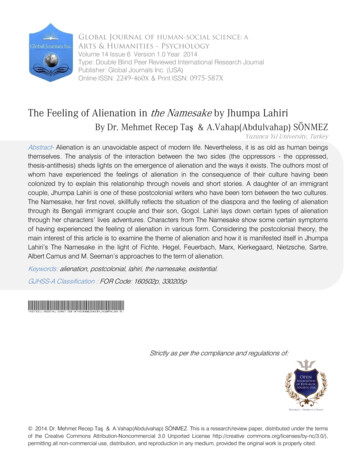
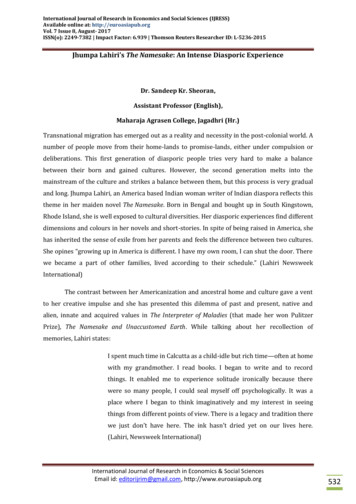
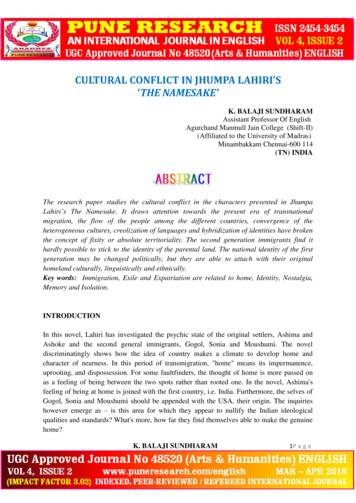
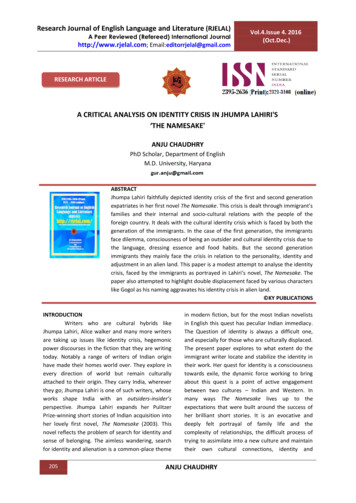
![JHUMPA LAHIRI [b. 1967] Interpreter of Maladies](/img/16/lahiri-interpreter-of-maladies-full-text.jpg)
